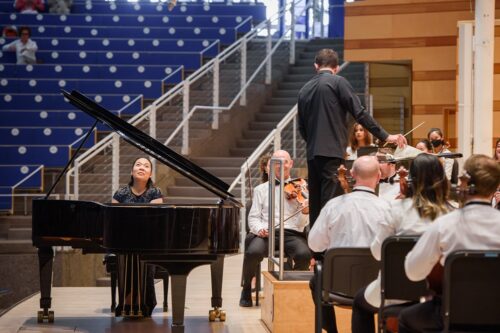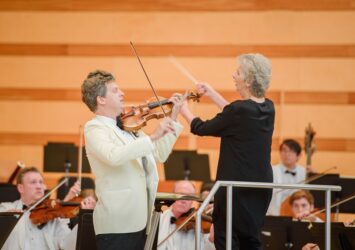 United States Aspen Music Festival [12]: Benedict Music Tent and Harris Hall, Aspen, Colorado, 13-15.8.2021. (HS)
United States Aspen Music Festival [12]: Benedict Music Tent and Harris Hall, Aspen, Colorado, 13-15.8.2021. (HS)

Program 30: Joyce Yang (piano), Aspen Chamber Orchestra / Benjamin Manis (conductor), Benedict Music Tent, 13.8.2021.
Kodály – Dances of Galánta
Liszt – Piano Concerto No.1 in E-flat major
Brahms – Symphony No.3 in F major
Program 31: Chamber Music Faculty Recital, Harris Hall, 14.8.2021.
Roberto Sierra – Cancionero Sefardí (Esther Heideman [soprano], Aspen Contemporary Ensemble / Timothy Weiss [conductor])
William Grant Still – Suite for Violin and Piano (Alexander Kerr [violin], Derek Wang [piano])
Gabriela Lena Frank – Tres Homenajes: Compadrazgo (Paul Kantor, Espen Lilleslåtten, [violins], Victoria Chiang [viola], Michael Mermagen [cello], Virginia Weckstrom [piano])
Program 32: James Ehnes (violin), Aspen Festival Orchestra / Jane Glover (conductor), Benedict Music Tent, 15.8.2021.
Beethoven – Violin Concerto in D major
Dvořák – Symphony No.8 in G major
Whatever magic Jane Glover brought with her from England for her annual conducting gig at the Aspen Music Festival, it worked splendidly on Sunday. She led the Aspen Festival Orchestra in its best showing yet this summer, drawing out details in the Beethoven Violin Concerto and making Dvořák’s Symphony No.8 a thrill ride of serious proportions.
And, despite rumblings of distant thunder, the rain stayed away until Sunday’s concert was over. Friday’s performance of the Liszt Piano Concerto No.1 was not so lucky.
Maybe Glover’s secret was simply really good conducting. In years past, her strongest impression here was made in the opera house, especially with Baroque composers and Mozart. In alternate years she leads one of the A-list orchestras, and always well, but this time she reached a higher order of magnitude.

James Ehnes was the soloist in the concerto, and he played the cadenzas with all the swagger one could want. But he also found a great partner in Glover. Her every phrase had an arc, and she winnowed the ends of those phrases so they did not cover Ehnes’ refined playing when it sailed into the fiddle’s highest notes.
When the orchestra carried the ball, Glover drew the full measure of muscle from the music. She allowed phrases to breathe, slowing a tad for emphasis only to pick up the pace without delay to keep things moving.
Known for his admirable accuracy, Ehnes also drew out the human communication in Beethoven’s music. At a measured pace, the opening movement had plenty of space for phrases to bloom. The unhurried flow of the Larghetto allowed the violinist to spin out the music serenely, and the Rondo finale popped out of the gate with sprightly flair.
Glover tied phrases in the symphony together seamlessly, a welcome approach as Dvořák tended to map his music in blocks. She made the flow feel utterly natural, even when a stentorian phrase interrupted a cozy moment. The orchestra’s players had room to make their own statements – especially the horns in the finale (which always remind my wife of a herd of happy elephants).
The brass and woodwinds distinguished themselves throughout. The strings, though a bit fewer than unusual (because of COVID protocols), never sounded undernourished. Glover struck excellent balances in tutti passages. It made the familiar music thoroughly satisfying, the way it ought to be heard – with freshness and intention.
At Friday evening’s Chamber Orchestra concert, the rain pounding on the tent roof interrupted Joyce Yang’s Liszt concerto just as she started the quiet slow movement, but she won over an enthusiastic audience with some thunder of her own. The omens were not promising when she first sat down at the piano: a clap of thunder echoed in the mountains, and a light rain set up a rattle. Yang gave conductor Benjamin Manis a worried look, and they got through the boisterous first movement, but it wasn’t long before a cloudburst dropped the heaviest rain on a concert this summer.
Although weather radar apps showed clearer air coming, a light rain persisted after a 10-minute delay. Yang and the orchestra not only made it through, they delivered an exciting performance with bravado piano work. The orchestra achieved fine balances without losing the pep in Liszt’s step.
Returning for an encore, Yang swiveled on the piano bench to face the audience, and grinned, ‘I’ll never forget this concert’. And then she lavished her most sensitive playing on Rachmaninoff’s Prelude in G-sharp minor Op.32 No.12. By then the downpour had quieted, and we could hear every note.
Manis, resident conductor of Houston Opera, had led this orchestra on 6 August in an excellent concert that featured soprano Golda Schultz (review click here). He stepped in Friday for Roderick Cox, who canceled shortly before he would have made his Aspen mainstage debut. The concert opened with a lively, deftly shaped run through Kodály’s Dances of Galánta, and concluded with a stately, confident traversal of Brahms’ Symphony No.3.
Maybe it was because this orchestra already had a concert under its belt with him as conductor, but balances among the sections and responsiveness by the whole orchestra were especially rewarding.
Saturday’s artist faculty recital in Harris Hall featured works that attempt to corral disparate musical forms into a classical frame. The results were mixed.
Best was a particularly alluring set of seven Sephardic Jewish songs, with flavors of Arabic exoticism and Klezmer spicing up the mix in Robert Sierra’s Cancionero Sefardí. Redolent of southern Spain, the seven songs got an atmospheric reading. All the slinky phrases from soprano Esther Heideman shone through against light but pungent accompaniment from the Aspen Contemporary Ensemble.
Violinist Alexander Kerr (who was concertmaster in the Friday concert) and pianist Derek Wang lavished colorful playing on William Grant Still’s jazz-infused 1943 Suite for Violin and Piano, even if Still’s attempt to fit African-American tunes into a violin suite didn’t quite swing.
Gabriela Lena Frank’s writing for piano quintet in Tres Homenajes: Compadrazgo juxtaposed music from various South American regions, but the piece never let the rhythms roll. Too much self-conscious dissonance robbed them of their folk essence.
Harvey Steiman
